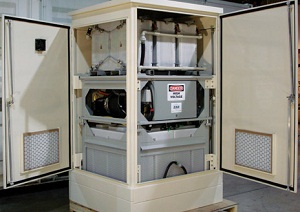Prudent Energy Storage sees high demand in rural nations
 Prudent Energy Storage Systems has seen tremendous growth and increased demand for its vanadium redox flow batteries, especially in remote areas of Africa.
Prudent Energy Storage Systems has seen tremendous growth and increased demand for its vanadium redox flow batteries, especially in remote areas of Africa.
Tim Hennessy, spokesman for Prudent, said he believes the energy storage technology the company specializes in is well-suited as a compliment to solar power generation. But for now, Prudent is focusing on making big changes for communities that need quick solutions.
The communities Prudent has worked with typically use diesel generators to power their telecommunications systems. Many of the communities have tried to switch over to photovoltaic solar systems, Hennessy said. But they were using the systems to charge traditional lead-acid batteries.
“The problem is that if you have a normal battery, you’re going to end up with the battery being cycled frequently and quickly,” Hennessy said. “And it’s going to kill the battery, and then you’ll end up running the diesel all the time.”
The Prudent battery holds a charge and doesn’t die. It can serve as a reliable back-up power source. Hennessy said many of the African communities the company has worked with use solar to power their systems during the day and charge the battery up, then discharge the battery completely overnight, reverting to solar power in the morning.
The energy storage system has saved communities 60 to 70 percent on diesel and paid for themselves in savings even without any government incentives or rebates in just three years, Hennessy said.
“That has got them really excited,” he said.
And more and more communities are ordering more and more of Prudent’s batteries. Saving diesel on power generation sets off a whole chain of savings and efficiencies, Hennessy said.
“The diesel is delivered with diesel,” he said, “on these long bumpy and sometimes really dangerous roads.”
The diesel is even stolen en route sometimes. So reducing the necessary diesel shipments is making a big impact on the African villages that invest in the batteries.
While Prudent Energy is seeing tremendous success in remote areas off the grid, the company’s services aren’t as applicable in the United States and Europe where most solar systems are grid-tied.
Hennessy said Prudent’s battery is huge and not realistic for most residential systems. It’s also uncommon that grid-tied systems would ever completely discharge a battery, which makes less expensive and bulky lead-acid batteries a more likely accessory here.
He has talked with major utility companies since a study was released last year indicating that shifting some peak energy demand at around 6 p.m., when people are home from work and the sun has gone down, to battery storage could save 1.3 gigawatts of power in California alone.
“Our technology may not be the right fit for that,” Hennessy said. “But I encourage them to look into battery storage to shift peak demand.”
Image courtesy of ZBB Tecnologies.



